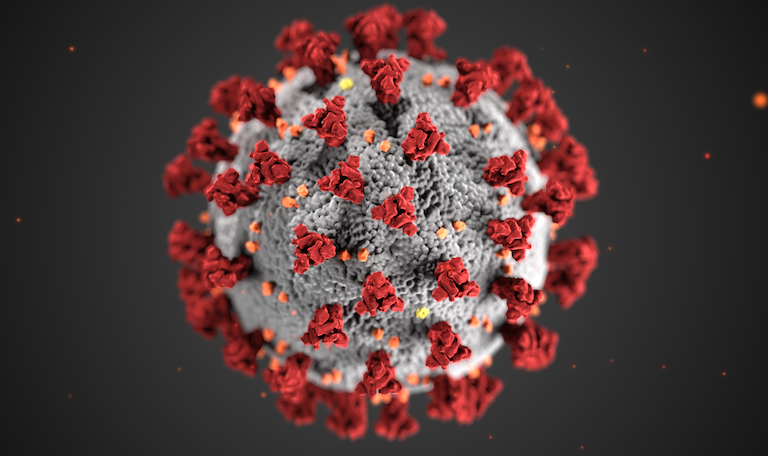In response to the COVID-19 pandemic, Iowa State University’s Office of the Vice President for Research (OVPR) has selected four high-impact projects led by or including Cyclone Engineering researchers to receive funding through a new seed program dedicated to addressing the ongoing coronavirus outbreak.
Established by the OVPR in late May 2020, the COVID-19 Research Seed Grant program (CRSG) was created to encourage faculty in all academic disciplines to apply their expertise to the COVID-19 pandemic. Each of the teams will receive $15,000 to pursue projects rapidly for up to six months. CRSG funding will support the initial stages of high-risk, high-reward projects that address the COVID-19 crisis.
Projects led by or including Cyclone Engineering faculty are:
Rapid, Low-Cost Detection of COVID-19 in Self-Administered Human Saliva Samples Using Printed Graphene Electrochemical Sensor
Jonathan Claussen, associate professor, Department of Mechanical Engineering
Carmen Gomes, associate professor, Department of Mechanical Engineering
Funding source: Office of the Vice President for Research
As testing for COVID-19 continues to be a complicated, costly, and often unpleasant process, Claussen and Gomes contend that there is a critical need to develop a simple, low-cost, and accurate technique for diagnosis. The team’s proposed testing system would use self-collected human saliva samples instead of nasal swabs administered by a medical professional. The alternate system would be able to provide results in approximately 20 minutes and would not require lab equipment or trained personnel. The technology could be used to check for COVID-19 before employees enter their place of work each day, or to help patients know if they are virus free and able to exit self-quarantine. Each test kit would cost less than $6 — compared to $35.92 for COVID-19 tests developed by the Centers for Disease Control and Prevention and $51.33 for commercial tests.
A Proof-of-Concept Study Towards a Handheld Respiratory Virus Sensor for Rapid Identification and Quantification of SARS-CoV-2 in Exhaled Breath
Meng Lu, associate professor, Department of Electrical and Computer Engineering and Department of Mechanical Engineering
Liang Dong, professor, Department of Electrical and Computer Engineering
Jianqiang Zhang, associate professor, Department of Veterinary Diagnostic and Production Animal Medicine
Funding source: Office of the Vice President for Research
Although also interested in examining better avenues for COVID-19 testing, Lu, Dong, and Zhang are looking away from saliva altogether and opting instead for a different type of sample to screen for the virus: breath. As simple as current alcohol breath tests, the team plans to collect virus particles directly from exhaled breath. The finished product will be a handheld breathalyzer with a response time of less than seven minutes and at a cost of less than $1 per test.
Point-of-Care Sensors for Rapid and Low-Cost Detection of COVID-19 Infections
Pranav Shrotriya, professor, Department of Mechanical Engineering
Marit Nilsen-Hamilton, professor, Roy J. Carver Department of Biophysics, Biochemistry, and Molecular Biology
Funding source: College of Agriculture and Life Sciences, College of Engineering
The increasing demand for access to COVID-19 testing resources is also the focal point for Shrotriya and Nilsen-Hamilton’s research, with an emphasis on reducing the rate of false negative and positive results. By using electrochemical sensors, the duo plans to develop a portable device that can detect the presence of SARS CoV-2 at a molecular level in saliva. To identify SARS-CoV2 infections, Shrotriya and Nilsen-Hamilton will equip sensor surfaces with DNA sequences that can hybridize with portions of the virus’ RNA genome. The sensor will convert the hybridization into an electrical signal, resulting in a positive or negative response.
Development of a High Throughput Drug Screening Platform for COVID-19
Donald Sakaguchi, Morrill Professor, Department of Genetics, Development, and Cell Biology
Metin Uz, associate scientist, Department of Chemical and Biological Engineering
David Verhoeven, assistant professor, Department of Veterinary Microbiology and Preventive Medicine
Funding source: Office of the Vice President for Research
Development of a protective COVID-19 vaccine and effective virus treatment protocols are both long-term goals, resulting in the immediate need for a platform to better understand host-pathogen interactions. Sakaguchi, Uz, and Verhoeven’s research will help to develop a novel, human-relevant 3D in vitro model of co-cultured human respiratory system cells to mimic the respiratory tract more accurately. The model will be used to screen COVID-19 drug candidates before they are used in human patients. Current screening platforms are predominantly based on static 2D cell culture, which does not correctly represent the microenvironment of the human respiratory system or cell-to-cell interactions.

